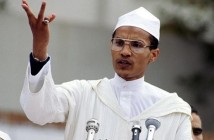 Moroccans approved a draft constitution, drawn up at the orders of King Mohammed VI, that the government said would bring long-awaited democratic changes to the North African nation, the Interior Ministry announced today.
Moroccans approved a draft constitution, drawn up at the orders of King Mohammed VI, that the government said would bring long-awaited democratic changes to the North African nation, the Interior Ministry announced today.
The proposal was supported in a nationwide referendum yesterday by more than 98 percent of voters. More than 72 percent of the country’s 13 million voters participated, Interior Minister Taieb Cherkaoui said.
Under the plan, the prime minister would be chosen from the party that wins elections and the king would retain the power to overrule or dissolve parliament, along with his role as “commander of the faithful” in the Islamic country.
The constitution was drawn up at King Mohammed’s orders in response to pro-democracy protests that echoed the uprisings in Tunisia and Egypt. Hundreds of thousands of people took to the streets to support the draft, calling it a step toward democratization. There were also demonstrations against it, with critics objecting to the fact that the drafting committee was appointed by the king and saying the changes don’t go far enough.
“The constitution will be approved,” Mohamed Darif, a political science professor at Hassan II University near Casablanca, said before the vote. “This is not the constitution of a democratic phase. But it’s a constitution that paves the way for a democratic phase.”
‘Democratic Course’
When he announced the draft, King Mohammed said it would “make Morocco a state that will distinguish itself by its democratic course.” The country’s biggest political parties, including the Islamist Justice and Development Party and the Union of Popular Forces, backed the text.
Demonstrations against corruption and the monarchy’s powers began in February, prompting the king to promise more liberties. While protests haven’t reached the scale of the movements that toppled leaders in Egypt and Tunisia, security forces clashed with protesters on May 29 and one activist in the coastal city of Safi died from injuries.
Morocco’s $80 billion economy may expand almost 5 percent this year, according to government forecasts. Tourism accounts for almost 10 percent of gross domestic product in the nation of 33 million.
Morocco has been invited to join the Gulf Cooperation Council, the six-nation group of monarchies whose largest member, Saudi Arabia, has opposed moves toward democracy in the Arab world. King Mohammed is the North African country’s secular and religious leader.
‘Protests Will Continue’
The Feb. 20 youth movement, which has led the protests in Morocco, called for a boycott of the referendum.
“While most Moroccans know that the constitution will pass, the protests will continue,” said Jalal al-Makhfi, a member of the movement. “The constitution doesn’t necessarily mean moving Morocco to democracy. The most important thing for Feb. 20 is fighting corruption.”
Mohamed Moujahid, secretary-general of the Unified Socialist Party, which also urged a boycott, said that under the proposals “the king conserves all powers and the fundamentals remain the same.”
Supporters of the constitution also acknowledge that it isn’t the end of the journey toward democracy.
“There are still many reforms that need to be done,” Mustapha Ramid, an official with the Justice and Development Party, said in a telephone interview. “We will vote ‘yes’ because this constitution contains several advances and acquired rights.”
The proposed changes also include allowing Moroccans to vote abroad, and making Amazigh, spoken by the Berber ethnic community, an official language alongside Arabic. While Islam would continue to be the state religion, freedom of worship would be guaranteed.






